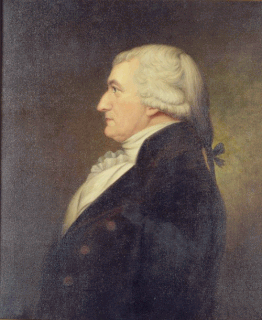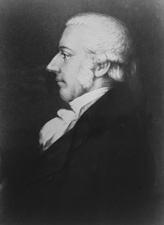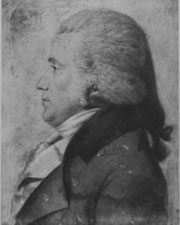Related Research Articles

This is a chronological listing, in timeline format, of the United States Congressional Delegations from Delaware to the United States Senate and United States House of Representatives. U.S Senators are elected by popular vote for a six-year term, beginning January 3. Since 1831, elections in Delaware have been held in the first week of November of the year noted. Before 1914 United States Senators were chosen by the Delaware General Assembly and before 1935 all Congressional terms began March 4.

Samuel Smith was a United States Senator and Representative from Maryland, a mayor of Baltimore, Maryland, and a general in the Maryland militia. He was the brother of cabinet secretary Robert Smith.

Dr. Henry Latimer was an American physician and politician from Newport, Delaware. He was elected to the Continental Congress from Delaware, and was a member of the Federalist Party, who served in the Delaware General Assembly, as U.S. Representative from Delaware, and U.S. Senator from Delaware.

Thomas Clayton was an American lawyer and politician from Dover in Kent County, Delaware. He was a member of the Federalist Party and later the Whig Party. He served in the Delaware General Assembly, as Attorney General of Delaware, as Secretary of State of Delaware, as Chief Justice of the Delaware Supreme Court, as U.S. Representative from Delaware, and as U.S. Senator from Delaware. In 1846 he was one of two members of the United States Senate to vote against declaring war on Mexico.

Richard Henry Bayard was an American lawyer and politician from Wilmington, Delaware. He was a member of the Whig Party, who served as the first Mayor of Wilmington, Chief Justice of the Delaware Superior Court, and as U.S. Senator from Delaware.

Nicholas Van Dyke was an American lawyer and politician from New Castle, Delaware. He was a member of the Federalist Party, who served in the Delaware General Assembly, as Attorney General of Delaware, as U.S. Representative from Delaware, and as U.S. senator from Delaware.

William Hill Wells was a lawyer and politician from Dagsboro, in Sussex County, Delaware. He was a member of the Federalist Party, who served in the Delaware General Assembly and as U.S. Senator from Delaware.
James Madison Broom was an American lawyer and politician from Wilmington, in New Castle County, Delaware. He was a member of the Federalist Party, who served as U. S. Representative from Delaware.
The following table indicates the party of elected officials in the U.S. state of Delaware:
The first 1804 United States Senate special election in New York was held on February 3, 1804, by the New York State Legislature to elect two U.S. Senators to represent the State of New York in the United States Senate.
The 1845 United States Senate special election in New York was held on January 18, 1845 by the New York State Legislature to elect two U.S. Senators to represent the State of New York in the United States Senate. The regular 1845 United States Senate election in New York was held on February 4, 1845, to elect a U.S. Senator to represent the State of New York in the United States Senate.
The United States Senate elections of 1804 and 1805 were elections that expanded the Democratic-Republican Party's overwhelming control over the United States Senate. The Federalists went into the elections with such a small share of Senate seats that even if they had won every election, they would have still remained a minority caucus.
The United States Senate elections of 1844 and 1845 were elections which, coinciding with James K. Polk's election, had the Democratic Party retake control of the United States Senate, gaining a net total of eleven seats from the Whigs.
The United States Senate elections of 1830 and 1831 were elections that had Jacksonians gain one seat in the United States Senate from the Anti-Jacksonian coalition, but lose one seat to the short-lived Nullifier Party. By the time Congress first met in December 1831, however, the Jacksonians had a net loss of one seat.
The 1806 United States House of Representatives elections in New York were held from April 29 to May 1, 1806, to elect 17 U.S. Representatives to represent the State of New York in the United States House of Representatives of the 10th United States Congress.

The 1808 United States House of Representatives elections in New York were held from April 26 to 28, 1808, to elect 17 U.S. Representatives to represent the State of New York in the United States House of Representatives of the 11th United States Congress. At the same time, a vacancy was filled in the 10th United States Congress.
The 1812 United States House of Representatives elections in New York were held from December 15 to 17, 1812, to elect 27 U.S. Representatives to represent the State of New York in the United States House of Representatives of the 13th United States Congress. At the same time, a vacancy was filled in the 12th United States Congress.
The 1816 United States House of Representatives elections in New York were held from April 23 to 25, 1816, to elect 27 U.S. Representatives to represent the State of New York in the United States House of Representatives of the 15th United States Congress. At the same time, a vacancy was filled in the 14th United States Congress.
The 1826 United States House of Representatives elections in New York were held from November 6 to 8, 1826, to elect 34 U.S. Representatives to represent the State of New York in the United States House of Representatives of the 20th United States Congress.

The 1814 United States Senate special election in Pennsylvania was held February 24, 1814. Jonathan Roberts was elected by the Pennsylvania General Assembly to the United States Senate.
References
- Munroe, John A. (1993). History of Delaware. University of Delaware Press. ISBN 0-87413-493-5.
- U.S. Congress (2006). Biographical Directory of the U.S. Congress. Retrieved January 1, 2006.
- Pickett, Russell S. (2006). Delaware and U.S.History. Retrieved January 1, 2006.
- Kestenbaum, Lawrence (2006). The Political Graveyard. Retrieved January 1, 2006.